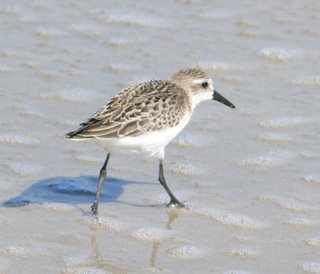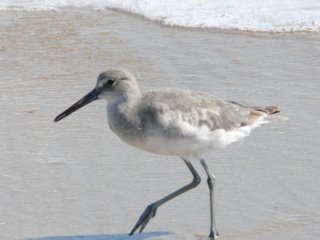Bird Herding
 One of my favorite old video clips from the Internet is about cat herding. The "catboys" are on horseback trying to drive a herd of domestic felines to market. The cats resist the efforts to be forced in the desired direction, as cats do. If one becomes injured the herder carries it on his saddle, but of course, gets scratched in the face for his efforts. I regard cat herding as some great and difficult effort, the purpose of which isn't really understood by anyone else, but which has great meaning to the herder.
The first rule of Birding Ethics is not to disturb the bird. Their lives are hard enough without being disrupted by people. The problem is learning how close you can come for observation and photographing without disturbing them. Are they disturbed if they walk away or only if they actually fly off? What if that was their next task for the day anyway? How can a person tell?
One of my favorite old video clips from the Internet is about cat herding. The "catboys" are on horseback trying to drive a herd of domestic felines to market. The cats resist the efforts to be forced in the desired direction, as cats do. If one becomes injured the herder carries it on his saddle, but of course, gets scratched in the face for his efforts. I regard cat herding as some great and difficult effort, the purpose of which isn't really understood by anyone else, but which has great meaning to the herder.
The first rule of Birding Ethics is not to disturb the bird. Their lives are hard enough without being disrupted by people. The problem is learning how close you can come for observation and photographing without disturbing them. Are they disturbed if they walk away or only if they actually fly off? What if that was their next task for the day anyway? How can a person tell?
 While we were in Virginia, we ran into a bit of that with the shore birds. The Willetts and little Sandpipers, would run back and forth on the beach as the waves advanced and receded. As we walked along behind them, they calmly moved on down the shore as if it were part of their original plan anyway. They didn't seem upset or disturbed in any way. As long as we walked in their direction, they simply walked faster than we did. Groups of Laughing Gulls did the same thing. They just didn't care that we were on their territory.
I had seen some Willetts at the Falls of the Ohio last summer when they blew in on a storm, and knew their wings displayed a distinct black and white pattern that was the best way to identify them. I thought the larger birds we saw were Willetts, but so many of the shore birds resemble each other, I wanted to see them flying to be sure, and to show the wing pattern to Dick. So I asked him to commit the birding sin of making them take flight. Run, make noises, I said, so we can see their wings.
Well, he tried, but the more he chased the faster they walked. I used to know some Tennessee Walking Horses on a 4H drill team that were the same way. When they were supposed to trot, they just walked faster. In a short time, we started laughing at the thought and sight of a grown man chasing these small birds and being out-paced by them! Eventually, they got tired of the game and flew off down the beach, maybe 20 feet or so, but we did get to see the wing pattern. And we resolved never to be bird herders again.
While we were in Virginia, we ran into a bit of that with the shore birds. The Willetts and little Sandpipers, would run back and forth on the beach as the waves advanced and receded. As we walked along behind them, they calmly moved on down the shore as if it were part of their original plan anyway. They didn't seem upset or disturbed in any way. As long as we walked in their direction, they simply walked faster than we did. Groups of Laughing Gulls did the same thing. They just didn't care that we were on their territory.
I had seen some Willetts at the Falls of the Ohio last summer when they blew in on a storm, and knew their wings displayed a distinct black and white pattern that was the best way to identify them. I thought the larger birds we saw were Willetts, but so many of the shore birds resemble each other, I wanted to see them flying to be sure, and to show the wing pattern to Dick. So I asked him to commit the birding sin of making them take flight. Run, make noises, I said, so we can see their wings.
Well, he tried, but the more he chased the faster they walked. I used to know some Tennessee Walking Horses on a 4H drill team that were the same way. When they were supposed to trot, they just walked faster. In a short time, we started laughing at the thought and sight of a grown man chasing these small birds and being out-paced by them! Eventually, they got tired of the game and flew off down the beach, maybe 20 feet or so, but we did get to see the wing pattern. And we resolved never to be bird herders again.
 One of my favorite old video clips from the Internet is about cat herding. The "catboys" are on horseback trying to drive a herd of domestic felines to market. The cats resist the efforts to be forced in the desired direction, as cats do. If one becomes injured the herder carries it on his saddle, but of course, gets scratched in the face for his efforts. I regard cat herding as some great and difficult effort, the purpose of which isn't really understood by anyone else, but which has great meaning to the herder.
The first rule of Birding Ethics is not to disturb the bird. Their lives are hard enough without being disrupted by people. The problem is learning how close you can come for observation and photographing without disturbing them. Are they disturbed if they walk away or only if they actually fly off? What if that was their next task for the day anyway? How can a person tell?
One of my favorite old video clips from the Internet is about cat herding. The "catboys" are on horseback trying to drive a herd of domestic felines to market. The cats resist the efforts to be forced in the desired direction, as cats do. If one becomes injured the herder carries it on his saddle, but of course, gets scratched in the face for his efforts. I regard cat herding as some great and difficult effort, the purpose of which isn't really understood by anyone else, but which has great meaning to the herder.
The first rule of Birding Ethics is not to disturb the bird. Their lives are hard enough without being disrupted by people. The problem is learning how close you can come for observation and photographing without disturbing them. Are they disturbed if they walk away or only if they actually fly off? What if that was their next task for the day anyway? How can a person tell?
 While we were in Virginia, we ran into a bit of that with the shore birds. The Willetts and little Sandpipers, would run back and forth on the beach as the waves advanced and receded. As we walked along behind them, they calmly moved on down the shore as if it were part of their original plan anyway. They didn't seem upset or disturbed in any way. As long as we walked in their direction, they simply walked faster than we did. Groups of Laughing Gulls did the same thing. They just didn't care that we were on their territory.
I had seen some Willetts at the Falls of the Ohio last summer when they blew in on a storm, and knew their wings displayed a distinct black and white pattern that was the best way to identify them. I thought the larger birds we saw were Willetts, but so many of the shore birds resemble each other, I wanted to see them flying to be sure, and to show the wing pattern to Dick. So I asked him to commit the birding sin of making them take flight. Run, make noises, I said, so we can see their wings.
Well, he tried, but the more he chased the faster they walked. I used to know some Tennessee Walking Horses on a 4H drill team that were the same way. When they were supposed to trot, they just walked faster. In a short time, we started laughing at the thought and sight of a grown man chasing these small birds and being out-paced by them! Eventually, they got tired of the game and flew off down the beach, maybe 20 feet or so, but we did get to see the wing pattern. And we resolved never to be bird herders again.
While we were in Virginia, we ran into a bit of that with the shore birds. The Willetts and little Sandpipers, would run back and forth on the beach as the waves advanced and receded. As we walked along behind them, they calmly moved on down the shore as if it were part of their original plan anyway. They didn't seem upset or disturbed in any way. As long as we walked in their direction, they simply walked faster than we did. Groups of Laughing Gulls did the same thing. They just didn't care that we were on their territory.
I had seen some Willetts at the Falls of the Ohio last summer when they blew in on a storm, and knew their wings displayed a distinct black and white pattern that was the best way to identify them. I thought the larger birds we saw were Willetts, but so many of the shore birds resemble each other, I wanted to see them flying to be sure, and to show the wing pattern to Dick. So I asked him to commit the birding sin of making them take flight. Run, make noises, I said, so we can see their wings.
Well, he tried, but the more he chased the faster they walked. I used to know some Tennessee Walking Horses on a 4H drill team that were the same way. When they were supposed to trot, they just walked faster. In a short time, we started laughing at the thought and sight of a grown man chasing these small birds and being out-paced by them! Eventually, they got tired of the game and flew off down the beach, maybe 20 feet or so, but we did get to see the wing pattern. And we resolved never to be bird herders again.
1 comment:
Now there is another reason to call them laughing gulls.
Post a Comment